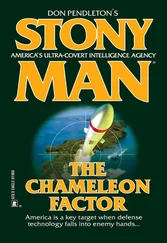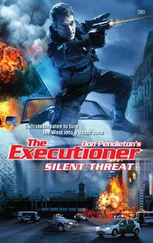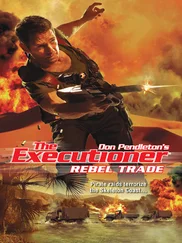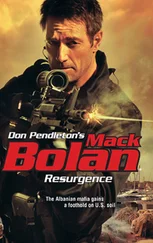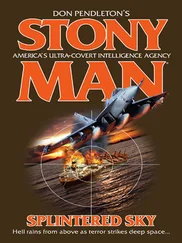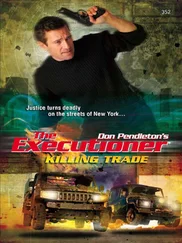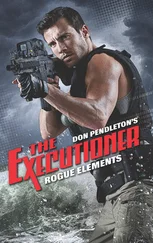Then the gates of hell opened up
The game was on, and the only way to win it was to charge on, straight ahead.
Bolan went through the curtain in a fighting crouch and dropped another adversary as his target tried to cock his AK-47. Shock was written on the gunman’s face as he went down.
The others started firing then, mostly without direction, making lethal noise as soldiers often did to keep the enemy at bay until they worked out what in hell was happening. The walls were being chipped and scarred by bullets, drilled through completely in places by the larger calibers.
Bolan had claimed the table of the second man he’d shot, flipped it to make a shield of sorts, but knew it wouldn’t serve him long or well. The first hits showered him with splintered wood, which meant that at least a couple of his enemies had seen him go to ground.
It was time to move.
But first, a little shock and awe.
The Executioner ®
 www.mirabooks.co.uk
www.mirabooks.co.uk
The meaning of good and bad, of better and worse, is simply helping or hurting.
—Journals
Ralph Waldo Emerson
1803–1882
Sometimes we have to fight evil with evil, fire with fire. Violence is the only language some predators understand, and I speak it fluently.
—Mack Bolan
THE MACK BOLAN LEGEND
Nothing less than a war could have fashioned the destiny of the man called Mack Bolan. Bolan earned the Executioner title in the jungle hell of Vietnam.
But this soldier also wore another name—Sergeant Mercy. He was so tagged because of the compassion he showed to wounded comrades-in-arms and Vietnamese civilians.
Mack Bolan’s second tour of duty ended prematurely when he was given emergency leave to return home and bury his family, victims of the Mob. Then he declared a one-man war against the Mafia.
He confronted the Families head-on from coast to coast, and soon a hope of victory began to appear. But Bolan had broken society’s every rule. That same society started gunning for this elusive warrior—to no avail.
So Bolan was offered amnesty to work within the system against terrorism. This time, as an employee of Uncle Sam, Bolan became Colonel John Phoenix. With a command center at Stony Man Farm in Virginia, he and his new allies—Able Team and Phoenix Force—waged relentless war on a new adversary: the KGB.
But when his one true love, April Rose, died at the hands of the Soviet terror machine, Bolan severed all ties with Establishment authority.
Now, after a lengthy lone-wolf struggle and much soul-searching, the Executioner has agreed to enter an “arm’s-length” alliance with his government once more, reserving the right to pursue personal missions in his Everlasting War.
Prologue
Chapter 1
Chapter 2
Chapter 3
Chapter 4
Chapter 5
Chapter 6
Chapter 7
Chapter 8
Chapter 9
Chapter 10
Chapter 11
Chapter 12
Chapter 13
Chapter 14
Chapter 15
Epilogue
Indian Ocean
Captain Danilo Andreychuk was worried. He had watched a trawler keeping pace with the Vasylna for the better part of two hours. Examining the rusty hulk through his binoculars from half a mile away, he could not escape a sense that he was being stalked.
It was entirely reasonable that Captain Andreychuk feared treachery. These waters, off the east coast of Somalia, teemed with hijackers and pirates who liked nothing better than to prey on merchant ships—stealing their cargo, sometimes offering it back for ransom to the rightful owners and frequently committing acts of needless violence against the transport crews.
And the Vasylna was a prime target.
Her cargo was supposed to be a deep, dark secret, but Andreychuk knew that every ship afloat sprang leaks from time to time. Some leaks let water infiltrate the cargo holds, while others provided information to the sea wolves who paid well for tips involving profitable merchandise.
With the exception of his first mate, Mykola Shymko, the captain didn’t trust the other members of his crew as far as he could throw them—preferably overboard. They were a mixed lot, competent enough as long as he was watching them perform their duties, but he assumed that most of them were ex-convicts. Their crude tattoos spoke volumes with respect to lives pursued outside the law.
Andreychuk noted that the trawler had drawn closer while he was distracted by his private thoughts. He had been debating whether he should hail the other ship, when a gruff voice behind him asked, “Is something wrong?”
The captain turned to face his latest client, known to him as Grigory Glazkov. The man was Russian, with a military look about him—flinty eyes and roughly chiseled features set beneath a graying crew cut that was thinning at the crown.
“I hope not,” Andreychuk replied. “But maybe so.”
Glazkov had seen the trawler now and recognized its flag. “Liberian,” he noted.
“Maybe,” Andreychuk said. “Maybe not.”
Glazkov had to have known that many vessels listed in the Liberian International Ship & Corporate Registry were Liberian in name only, logged as a matter of convenience that frequently included tax evasion and concealment of the true owner’s identity. The trawler’s flag—resembling that of the United States, but with only one star in its blue canton, and eleven red-and-white stripes in its field instead of thirteen—told Andreychuk nothing.
“Can we outrun them, if need be?” Glazkov inquired.
Andreychuk shrugged and said the obvious. “She’s keeping up so far.”
They were two miles offshore from Bargaal, still some thirteen hundred miles from their intended destination of Mombassa, Kenya. Andreychuk had no idea how fast the nameless trawler could travel—and now he saw that it didn’t matter. “Speedboats!”
From Glazkov’s lips, it sounded like a curse.
And so it was.
Three sleek powerboats—one red, two white—had suddenly appeared from the trawler’s starboard shadow and were racing toward the Vasylna at full speed, fairly skimming across the ocean’s surface. Each carried five or six men, and Andreychuk didn’t need his binoculars to know they were armed.
“You can repel them, yes?” Glazkov demanded.
“Perhaps.” Andreychuk’s tone left no doubt of his skepticism.
Even as he spoke, the first speedboat reached the Vasylna, one of its passengers raising a stubby weapon to his shoulder and squeezing its trigger. With a muffled popping sound, a grappling hook hurtled over the Vasylna’s port-side railing and caught hold, trailing a crude rope ladder behind it.
“We must fight back!” Glazkov barked at him, reaching underneath his jacket to produce an automatic pistol.
“Not so fast, Comrade,” another voice said from behind the Russian.
Glazkov and Andreychuk turned as one, to find a stocky figure standing in the wheelhouse doorway. Mykola Shymko held a pistol of his own, aimed at the Russian’s head.
“Full stop, Captain, I think,” the first mate said.
So much for trust.
Mogadishu, Somalia
Mogadishu—or Muqdisho, in Arabic—was the crossroads of East Africa. Local natives opened seafaring trade with India in the first century, and later welcomed Portuguese merchants and seamen. Ali bin Said al-Busaid, the fourth sultan of Zanzibar, leased Mogadishu to Italy in 1892, while his successors sold it outright to Rome in 1905. Kenya captured the city in 1941, then yielded control to Great Britain from 1950 to 1960, with the advent of chaotic independence. But Somalia’s capital retained its Italian flavor, at least in the names of its streets. Italian coexisted with English, Arabic and Somali as one of Somalia’s four official languages.
Читать дальше
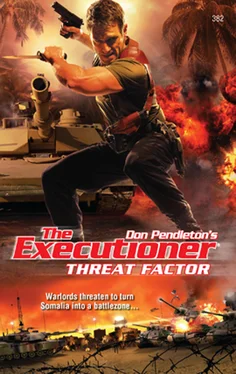
 www.mirabooks.co.uk
www.mirabooks.co.uk


